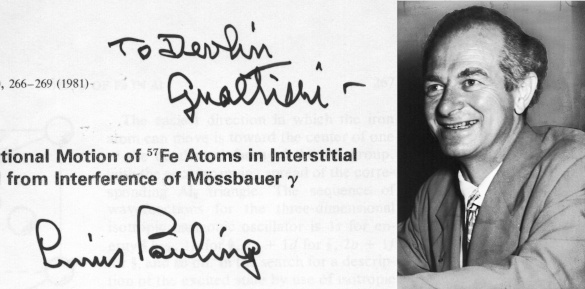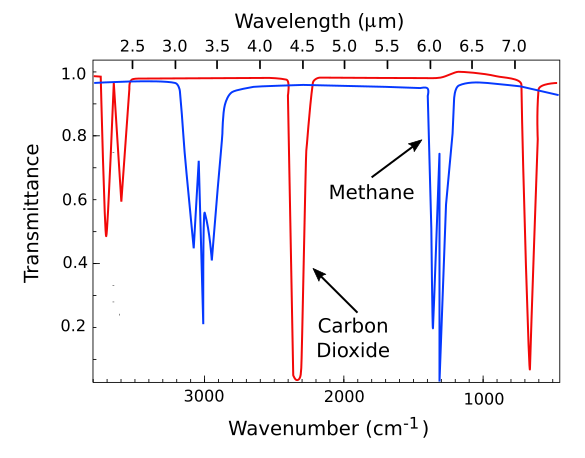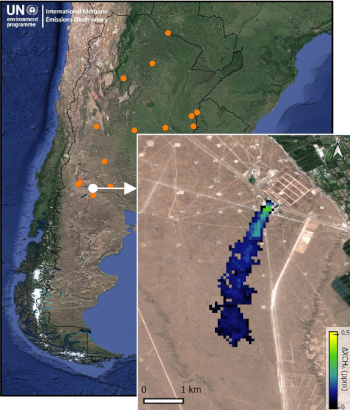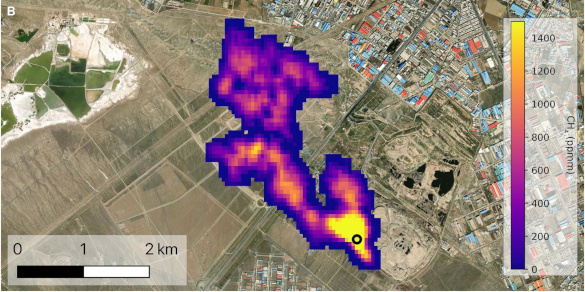Methane Emissions
February 19, 2024
Physicist and
Nobel Laureate,
Ernest Rutherford (1871-1937), has been characterized as a
force of nature.[1] Although Rutherford was a
physicist, he was awarded the 1908
Nobel Prize in Chemistry for the discovery of the
radioactive decay of
elements. This must have reinforced his spoken belief that serious
science is all
physics, quoted as "
All science is either physics or stamp collecting."
Chemists had their own force of nature,
Linus Pauling (1901-1994), who
published more than 800
papers and
books on
scientific topics.[2] Pauling was awarded the 1954 Nobel Prize in Chemistry in 1954 "
for his research into the nature of the chemical bond and its application to the elucidation of the structure of complex substances." He
parlayed his scientific
fame to
lobby against
nuclear weapon testing. His efforts were
bolstered by a 1961 study of
children's teeth (the
Baby Tooth Survey) showed high levels of the
strontium-90 isotope, supposedly from the
milk of
cows ingesting grass contaminated by
radioactive fallout.

A circa 1954 photograph of Linus Pauling (1901-1994) and a scan of a reprint of one of his published article that he so kindly autographed for me.[3]
(Right image, a scan of a portion of my copy of the reprint. Left image, a Library of Congress photograph, reproduction Number LC-USZ62-76925, via Wikimedia Commons. Click for larger image.)
In
characteristic retaliation for his activism, the
United States State Department denied Pauling a
passport in 1952 for travel to a
scientific conference in
London, England. However, in those days, the
advice of scientists was highly
respected, and
public pressure resulted in a
moratorium on above-ground
nuclear weapons testing. This moratorium was
codified by the 1963
Partial Test Ban Treaty, formally known as the 1963 Treaty Banning Nuclear Weapon Tests in the Atmosphere, in Outer Space and Under Water, between the
United States and the
Soviet Union. By this treaty, nuclear weapon's testing could only be done
underground. For his nuclear weapons activism, the
Nobel Prize Committee awarded Pauling the reserved 1962
Nobel Peace Prize, making Pauling and
Marie Curie (1867-1934) the only two people to be awarded
Nobel Prizes in different fields.
So, why is this
prelude relevant to the
topic of this
article,
methane emission? One outcome of nuclear test ban treaty was the
trust, but verify principle that one should monitor treaty
compliance. To ensure compliance with the nuclear test ban treaty, the United States relied on a series of
Earth observation satellites in its
Project Vela. These satellites detected 41 nuclear weapons tests prior to the treaty; and, interestingly, a single detection suggestive of a test roughly midway between
Africa and
Antarctica, on September 22, 1979. This is known as the
Vela incident. It's still unknown whether this was a nuclear test, and which
countries might have been involved.
As I've written in several previous articles (
Methane and Global Warming, June 6, 2022, and
Sulfur Hexafluoride, October 16, 2023), there exist
greenhouse gases that are much more
potent than
carbon dioxide. One of these is methane, which is about 25 times more powerful a
global warming agent than carbon dioxide. Fortunately, the
atmospheric residence time of methane is approximately nine
years, while the affect of carbon dioxide is considerably longer.[3] It's
estimated that about 40% of the
Ford Model T emissions from 1911 are still in our atmosphere.[3] Methane reduction would be a simple and quick way to get back on track to a cooler world with less
extreme weather. Treaties on methane reduction will likely be proposed; and, once again, we need ways to monitor compliance.
One glance at the
infrared spectrum of
carbon dioxide, the principal cause of global warming, and that of methane, shows the source of the global warming problem. The infrared
radiation that the
Earth seeks to
radiate after being
heated by
sunlight is not
transmitted back into
space; rather, it is
absorbed by these atmospheric components.

General features of the infrared transmittance of carbon dioxide and methane, as derived from various Internet sources and rendered using Inkscape. Higher resolution spectra can be found at refs. 5-6.[5-6]
Global carbon dioxide emissions for 2022 are estimated to be more than 36.8 billion
metric tons.[7] Global methane emissions in 2022 were estimated as 580 million metric tons (14.5 billion tons CO
2 equivalent), of which
anthropogenic emissions were 60%, the rest coming from
natural sources.[8]
Biological emissions take many forms. There's
microbial emission in
wet,
anaerobic environments such as
swamps and other
wetlands. Smaller amounts of methane are emitted by
enteric fermentation in
termites and
wild animals.
Food production is a problem, also, since methane is a
byproduct of
digestion in
cows and other
ruminants.
Animal waste and
landfills emit methane, as does production of the
fossil fuels,
coal and
oil. Coal and oil production contributes about 30% of the total methane emission, and these methane sources are easy to pinpoint and control.
A Methane Alert and Response System (MARS) was initiated at the
2022 United Nations Climate Change Conference. MARS is a global system for sharing of satellite-detected methane emissions to promote
emission mitigation efforts. Since January, 2023, the
United Nations International Methane Emissions Observatory has detected nearly 1,500 methane
plumes from the global
energy industry, of which about a third could be traced to specific facilities by other Earth observation satellites. This allowed MARS notification of the respective governments.

Methane event detections between January, 2021, and August, 2023, in Argentina by the European Space Agency's Sentinel-5P satellite. The orange dots are the estimated locations.
The inset image shows a methane plume detected on January 29, 2023.
(Figure 2 on page 10 of reference 9.[9] Click for larger image.)
NASA has an Earth observation
instrument, the
Earth Surface Mineral Dust Source Investigation (EMIT) imaging spectrometer, deployed on the
International Space Station.[10-11] EMIT measures
reflected solar radiation in the
visible and
infrared spectra at 285 distinct
wavelengths from 381-2493
nanometers. This spectral region includes prominent methane and carbon dioxide
absorption features in the infrared.[10]
Geographical coverage is from 51.6° N
latitude to 51.6° S latitude, with an average of 10 visits to a location each year.[11] In the first 30 days of EMIT operation, methane emissions were seen to vary at a regional scale, and one observed emission from
Turkmenistan showed a methane release of 731 &plusmin; 148 metric tons per hour.[10]

A methane plume from the active face of a landfill in Iran emitting about five tons of methane per hour.
(Figure 2B of ref. 10, distributed under a Creative Commons Attribution NonCommercial License 4.0 (CC BY-NC).Click for larger image.)
The United States is attempting to reach zero greenhouse gas emissions by 2050; and, to this end, the
US Environmental Protection Agency (EPA) has issued a new
federal rule to reduce methane emission.[12] The EPA estimates that this rule will prevent an estimated 58 million
tons of methane emissions from 2024 to 2038, an amount with the global warming equivalent of the carbon dioxide emitted by the US power sector in 2021.[12] The EPA estimates that the net
financial benefit of this, with respect to
savings from climate events, and from
health benefits, is at least $7.3 billion a year from 2024-2038.[12]
The new EPA rule includes a
Super Emitter Program> by which
third parties such as
environmental groups can detect and report large methane releases from oil and gas sites that account for nearly half the methane emissions from the oil and gas industry.[12] The oil industry must also phase out
routine natural gas flaring at new
oil wells.[12] There's a further requirement for comprehensive
monitoring for methane
leaks from well sites and
natural gas compressors. The new rule further creates requirements for reduced emission from
storage tanks.[12]
References:
- Richard Reeves, "A Force of Nature: The Frontier Genius of Ernest Rutherford," W. W. Norton, December 3, 2007, 208 pp. (via Amazon).
- Linus Pauling and The Nature of the Chemical Bond: A Documentary History - Special Collections - Oregon State University.
- Linus Pauling, "The structure and oscillational motion of 57Fe atoms in interstitial sites in Al as determined from interference of Mössbauer γ radiation," Journal of Solid State Chemistry, vol. 40, no. 3 (December, 1981), pp. 266-269, https://doi.org/10.1016/0022-4596(81)90391-1.
- Increase in atmospheric methane set another record during 2021, National Oceanic and Atmospheric Administration, U.S. Department of Commerce, Press Release, April 7, 2022.
- NIST Chemistry WebBook-Methane.
- NIST Chemistry WebBook-Carbon Dioxide.
- Global CO2 emissions rose less than initially feared in 2022 as clean energy growth offset much of the impact of greater coal and oil use, International Energy Agency, March 2, 2023
- Global and U.S. Methane Emissions in 2022 Based on IEA's Tracker, International Energy Agency, February 28, 2023.
- An Eye on Methane: International Methane Emissions Observatory 2023 Report, United Nations Environment Programme, December 1, 2023.
- Andrew K. Thorpe, Robert O. Green, David R. Thompson, Philip G. Brodrick, John W. Chapman, Clayton D. Elder, Itziar Irakulis-Loitxate, Daniel H. Cusworth, Alana K. Ayasse, Riley M. Duren, Christian Frankenberg, Luis Guanter, John R. Worden, Philip E. Dennison, Dar A. Robert, K. Dana Chadwick, Michael L. Eastwood, Jay E. Fahlen, and Charles E. Miller, "Attribution of individual methane and carbon dioxide emission sources using EMIT observations from space," Science Advances, vol. 9, no. 46 (November 17, 2023), DOI: 10.1126/sciadv.adh2391. This is an open access article with a pdf file here.
- Alex Lopatka, "NASA instrument pinpoints superemitter sites," Physics Today, November 2, 2023, DOI:https://doi.org/10.1063/PT.6.1.20231120a.
- Jeff Brady, "EPA aims to slash the oil industry's climate-warming methane pollution," NPR, December 2, 2023.
Linked Keywords: Physicist; Nobel Prize in Chemistry; Nobel Laureate; Ernest Rutherford (1871-1937); radioactive decay; chemical element; science; physics; All science is either physics or stamp collecting; chemist; Linus Pauling (1901-1994); scientific literature; publish; scientific journal; paper; book; scientific topic; for his research into the nature of the chemical bond and its application to the elucidation of the structure of complex substances; parlay; notability; fame; lobbying; lobby; nuclear disarmament; nuclear weapon testing; bolster; deciduous teeth; children's teeth; Baby Tooth Survey; strontium-90; isotope; milk; cattle; cow; ingestion; grass; contamination; contaminated; nuclear fallout; radioactive fallout; Linus Pauling autograph; circa; 1954; reprint; Wikimedia Commons; characteristic; revenge; retaliation; United States State Department; passport; academic conference; scientific conference; London, England; advice (opinion); respect; respected; opinion poll; public pressure; moratorium (law); codification (law); codified; Partial Nuclear Test Ban Treaty; United States; Soviet Union; underground nuclear weapons testing; Nobel Prize Committee; Nobel Peace Prize; Marie Curie (1867-1934); Nobel Prize; prelude; relevant; topic; blog article; methane; air pollution; emission; Trust, but verify; regulatory compliance; Earth observation satellite; Project Vela; Africa; Antarctica; Vela incident; country; Methane and Global Warming, June 6, 2022; Sulfur Hexafluoride, October 16, 2023; greenhouse gas; potent; carbon dioxide; global warming; atmosphere of Earth; atmospheric; residence time; year; approximation; estimate; Ford Model T; extreme weather; infrared; electromagnetic spectrum; electromagnetic radiation; Earth; thermal radiation; heat; heated; sunlight; transmittance; transmitted; outer space; absorption (electromagnetic radiation); Internet; Inkscape; resolution spectra; metric ton; human impact on the environment; anthropogenic; nature; natural; biology; biological; microorganism; microbial; wetland; anaerobic organism; environment (biophysical); swamp; gut flora; enteric; fermentation; termite; wildlife; wild animals; food industry; food production; byproduct; digestion; cattle; cow; ruminant; manure; animal waste; landfill; fossil fuel; coal; petroleum; oil; 2022 United Nations Climate Change Conference; climate change mitigation; emission mitigation; United Nations; International Methane Emissions Observatory; plume (fluid dynamics); energy industry; Argentina; European Space Agency; Sentinel-5P satellite; NASA; scientific instrument; Earth Surface Mineral Dust Source Investigation (EMIT) imaging spectrometer; International Space Station; reflection (physics); reflected; sunlight; solar radiation; visible light; infrared; spectrum; spectra; wavelengths; nanometer; absorption (electromagnetic radiation); geography; geographical; latitude; Turkmenistan; methane plume from a landfill in Iran; hour; Creative Commons Attribution NonCommercial License 4.0 (CC BY-NC); United States Environmental Protection Agency (EPA); rulemaking; federal rule; ton; finance; financial; savings; health benefit; third-party beneficiary; environmental movement; environmental group; routine natural gas flaring; oil well; greenhouse gas monitoring; leak; natural gas; gas compressor; storage tank.